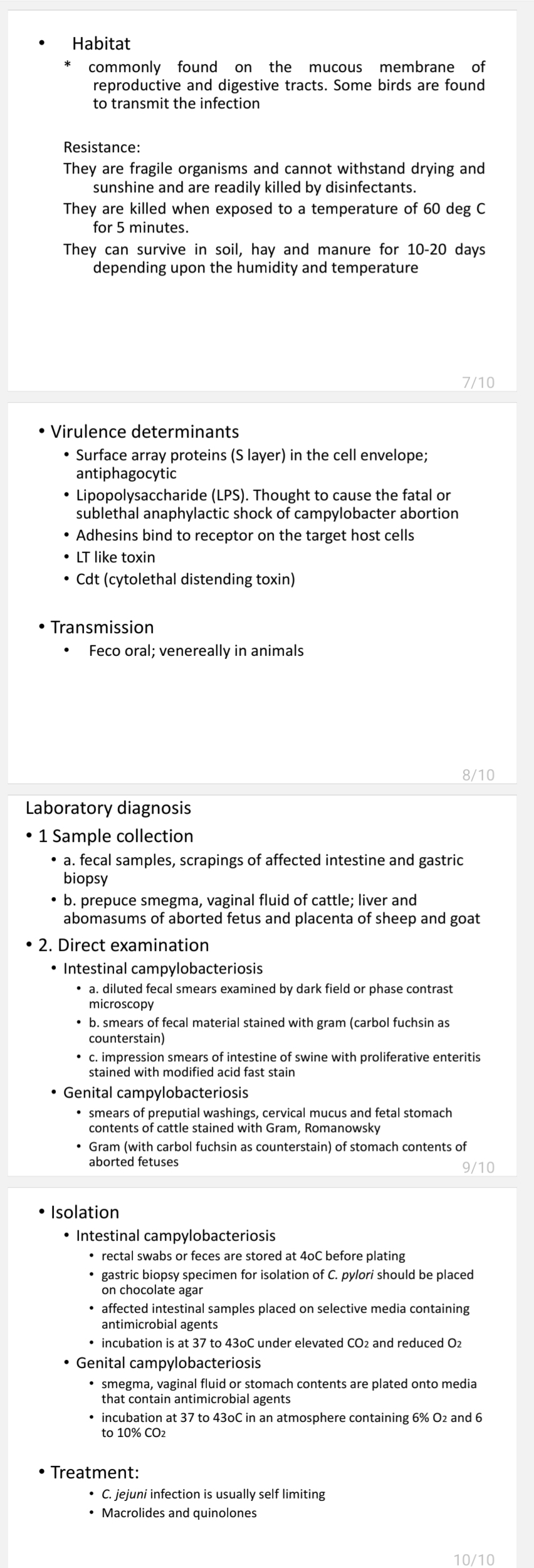Campylobacter
1/20
There's no tags or description
Looks like no tags are added yet.
Name | Mastery | Learn | Test | Matching | Spaced |
|---|
No study sessions yet.
21 Terms




Dart-like or corkscrew-like
campylobacter jejeni and campylobacter coli
? or ? motility but there are certain species like ? and ? that can't produce non-motile variant especially on frequent sub culturing of the organism.
Tend to be capsulated too
respiratory pathway and respiration
Generate energy from the oxidation of amino acids through ? pathway or ?
Although the organism may possess enzyme like catalase and superoxide dismutase, they're often overwhelmed by the peroxide and superoxide when grown in the presence of oxygen. Such that the organism is microaerophilic only or even Anaerobic
Why Campylobacter organism is microaerophilic only or even Anaerobic?
S or Gull-wing
Some Cells tend to stick together, they will form an ? or ? shape
C. fetus subsp. venerealis
? - found in genital tract
C. fetus subsp. fetus
? - found in the placenta
Campylobacter fetus when causing abortion
Generally when this cause abortion, i would have been a mid-to-late third trimester of pregnancy
C. Fetus subsp. Fetus, C. Jejuni, and C. coli
C. jejuni
C. coli
Most commonly isolated is ?, ?, and ?
? may occur in 95% of cases
? in 5%
C. Coli
C. Fetus subsp fetus
C. Jejuni
C. Uppsaliensis
Among these 4 different species causing diseases in animal as being Zoonotic
S layer
? confer serum-resistance by inhibiting the binding complement, particularly C3D from the binding to the cell surface. This prevents the formation of the terminal C5 to C9 which is the membrane attack complex
At the same time, this prevents opsonization C3B cellular receptor
? covers the underlying immunogenic Lipopolysaccharide layer, which would render it inaccessible or undetectable by the host cells
Adhesins
Generally ? bind to fucose-containing compounds in the target cells.
Penetrate the intestinal mucus layer, the ability to invade enterocytes to gain resistance from getting eliminated by normal peristalsis movement of Intestines
LT like toxin
? like the toxins produced by E. Coli that increase the cyclic AMP (cAMP), causing diarrhea, cytoskeletal rearrangement, which may resemble pedestal formation in the intestinal cells
Cdt
? blocks the cell division in G2 or Mitotic (M) phase which leads to cell death
3%
plasmid-mediated
Lawsonia
Organism is sensitive to ? or more Sodium chloride. Do not grow in media with higher salt content
In terms of resistance the organism may possess ? resistance to tetracycline
? does not grown in lifeless media
Porcine Intestinal adenomatosis
● Thickening of the intestinal mucosa
● Polyp-like growth in the intestinal wall
Necrotic Enteritis
● Char. by necrosis of epithelium
● Thickening of mucosa
Regional ileitis
● Intestine may appear as pipe
● “Hose pipe gut”
● Hypertrophy of outer muscle coat
Proliferative Hemorrhagic Enteropathy
● Manifested by severe hemorrhages in the distal portion of small and large intestine
Lawsonia Intracellularis
● Gram negative, curved, and without fimbriae or spores.
● A single polar flagellum is responsible for the darting motility of extracellular organisms.
● Thickening of intestinal mucosa
➢ Infected cells fail to mature, thus won’t be shed out
➢ Absorptive capability affected, hence diarrhea
● Cultivation in vitro requires dividing eukaryotic cells (cannot be grown in laboratory)
Lipopolysaccharide (LPS)
● Thought to cause the fatal or sublethal anaphylactic shock of campylobacter abortion